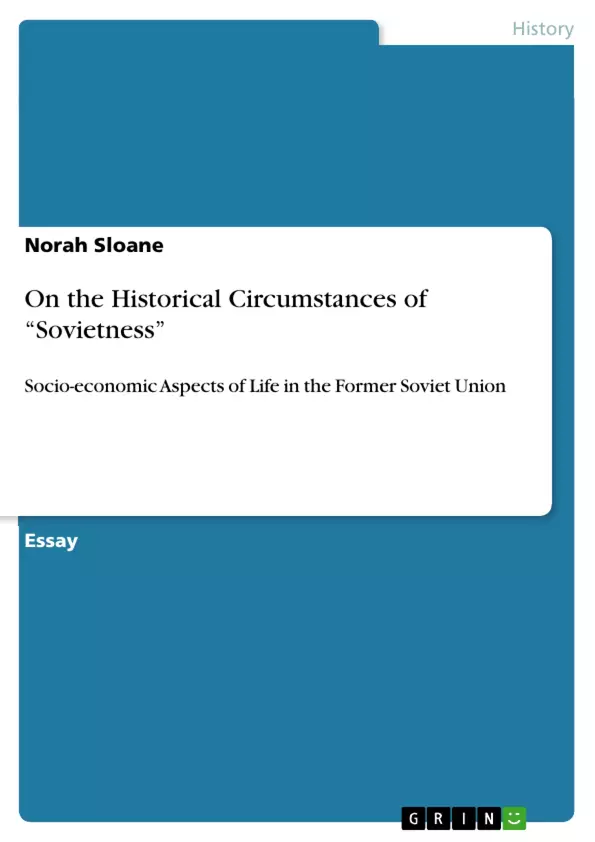This essay takes a closer look at some aspects of life in the former Soviet Union.
The Soviet Union emerged out of a utopian vision of a fabricated "shelter" for the workers of the world. Built on the skewed and butchered words of Marx and Engels, empire born revolutionaries in the early twentieth century organized and printed countless newspapers pumped full of their hate of imperialism, capitalism, and inequity. They mustered the strength to remove the Tsars in the midst of the world’s first grand war toppling the autocratic regime that ruled from the Baltic Sea to the Pacific and from the Arctic Ocean to the Black and Caspian Seas. The work of these fringe extremists, of these intellectual middle-class men, these self-proclaimed emancipators, set the stage for decades of social abuse upon millions of people.
The vision for the Soviet Union, as painted by Lenin, and subsequently painted over and framed up by Stalin, was one of a uniform state free of the burdens of choice. The lands and peoples under the Soviet legislative body existed stripped of sovereignty, freedom, expression, and volition. Stalin intended to rip the past out of people to formulate his vision for the future. All peoples, regardless of race, ethnicity, and gender were to be stripped of their cultural backgrounds, their religious roots, their familial affinities, and their geographically embedded social positions. The Soviet people were a new breed birthed into an age of collective destruction. Communities and their timeless histories were inked over with the deep crimson of the flags of the Red Army.
Table of Contents
- The Circumstances of “Sovietness” and the March of Red Progress
- The Soviet Ideal and Its Evolution
- The Shaping of the Soviet Ideal
- The Soviet Ideal Under Stalin
- The Post-Stalin Era
- The Role of the State and Bureaucracy
- The Five-Year Plans
- The Power of Bureaucracy
- The Corruption of the System
Objectives and Key Themes
This text examines the emergence and evolution of the Soviet ideal, exploring how a utopian vision of a classless society transformed into a system of social control and oppression. It delves into the role of the state, bureaucracy, and individual agency in shaping Soviet society.
- The formation and development of the Soviet ideal
- The impact of Stalin's reign on Soviet society
- The role of bureaucracy in perpetuating and reinforcing the Soviet system
- The relationship between the state and the individual in Soviet society
- The consequences of the Soviet system's inherent contradictions
Chapter Summaries
- The Circumstances of “Sovietness” and the March of Red Progress: This chapter introduces the origins of the Soviet Union, tracing its roots to the utopian ideals of Marx and Engels. It highlights the rise of revolutionary movements in Russia and the establishment of the Soviet state.
- The Soviet Ideal and Its Evolution: This chapter examines the evolution of the Soviet ideal, focusing on the impact of Stalin's rule and the subsequent post-Stalin era. It explores how the Soviet regime shaped the lives and experiences of its citizens.
- The Role of the State and Bureaucracy: This chapter delves into the role of the state and bureaucracy in Soviet society. It analyzes the impact of Stalin's Five-Year Plans and explores the ways in which bureaucracy became a tool for control and oppression.
Keywords
Key terms and concepts central to this analysis include: Sovietness, utopianism, revolution, totalitarianism, Stalinism, bureaucracy, social control, oppression, Five-Year Plans, and individual agency.
Frequently Asked Questions
What are the historical origins of the Soviet Union according to this essay?
The Soviet Union emerged from a utopian vision based on the theories of Marx and Engels, brought to life by revolutionaries who toppled the Russian Tsarist regime during World War I.
How did the "Soviet Ideal" evolve under Stalin's rule?
Under Stalin, the ideal shifted toward a uniform state where individual choice was replaced by collective destruction, and cultural, religious, and familial identities were suppressed.
What role did bureaucracy play in Soviet society?
Bureaucracy became a powerful tool for social control and oppression, managing the economy through Five-Year Plans while often falling into systemic corruption.
What was the impact of the Five-Year Plans?
The Five-Year Plans were central to the state's command economy, driving progress at the cost of individual sovereignty and freedom of expression.
How did the Soviet state view individual agency?
Individual agency was largely stripped away, as citizens were expected to conform to a fabricated "Sovietness" that prioritized the state's utopian goals over personal liberty.
What happened to cultural and religious roots in the Soviet Union?
The regime aimed to rip out the past, stripping people of their ethnic, religious, and familial backgrounds to create a new, uniform breed of Soviet citizens.
- Citation du texte
- Norah Sloane (Auteur), 2015, On the Historical Circumstances of “Sovietness”, Munich, GRIN Verlag, https://www.grin.com/document/454668



